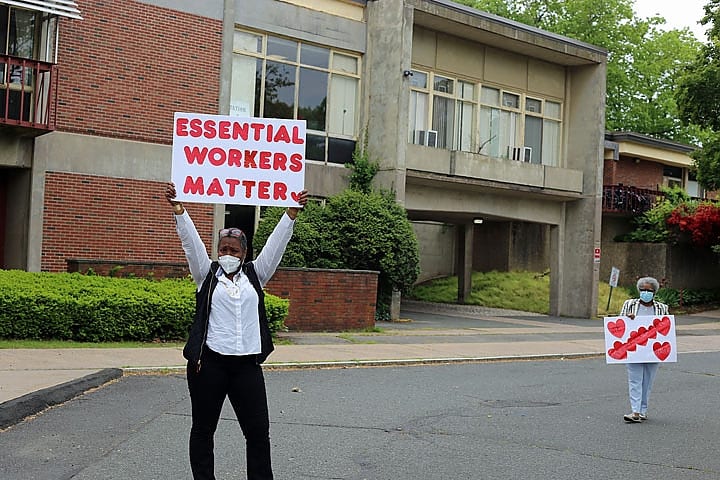Nursing homes are now being asked to allow outdoor visits at least 30 minutes long, and indoor visits for compassionate and end-of-life care.
By Christine Stuart, CTNewsJunkie.com
Acting Commissioner of Public Health Deidre Gifford issued an order Thursday expanding visitation at Connecticut nursing homes and long-term care facilities to allow more outside visits and limited indoor visitation.
Visitors at these facilities have been limited since March 13 due to the fragile populations they serve. More than 3,000 people have died in Connecticut’s nursing homes and long-term care facilities since the start of the pandemic. But it’s been nearly six months for residents to struggle with social isolation.
“Family members have been waiting almost 6 months to be reconnected with residents in long-term care communities,” Connecticut’s Long-Term Care Ombudsman Mairead Painter said. “This expanded guidance addresses the need for individualized care to prevent further decline.”
Under the guidance issued Thursday, the department is asking nursing homes to allow outdoor visits at least 30 minutes long, virtual visits, phone calls, and window visits. It will allow indoor visits only for compassionate and end-of-life care.
Not everyone believes the guidance goes far enough.
Two weeks ago a coalition of advocates including Connecticut Legal Services and Disability Rights Connecticut, wrote to ask the state to expand indoor visits at any facility that has not had a positive COVID-19 case in the past 14 days. They suggested visitors wear personal protective equipment (PPE) provided by the nursing home and maintain social distancing, along with undergoing a temperature check and symptom screening.
However, the guidance issued Thursday restricts indoor visits for compassionate care and end-of-life care.
“Why should families need to wait until their loved one deteriorates before they can see them? Shouldn’t the goal be preventative – to do everything possible, within safety precautions due to COVID, to maintain quality of life?” the advocates said in response to the new guidance.
“We are very disappointed that the order did not require the kind of indoor visitation which a broad coalition of advocates and family members is calling for, under controlled conditions, and which five other states in the country already permit,” the coalition said in a statement.
They had argued that “Some indoor visits are essential because of mobility issues and weather – summer heat, rain and the inevitable arrival of cold weather.”
The state’s two nursing home associations said they understand the desire to get back to indoor visits.
“Nursing home providers keenly understand the critical connection between visits from loved ones in nursing homes and the overall health and well-being of residents. We are all striving for the time when we can return to indoor visitation, but we also know that it must be done with care and caution and mindful of the public health and safety of all nursing home residents and staff,” Matt Barrett, president and CEO, CAHCF/CCAL and Mag Morelli, president of LeadingAge Connecticut said in a statement.
While the DPH is not letting its guard down, the order acknowledges the important role of visits for residents of long-term care facilities.
“We must continue to protect residents from exposure to this deadly virus, but not at the expense of sacrificing their emotional health and wellbeing,” Gifford said. “Residents and their families and loved ones on the outside have a right to see each other on a regular basis. With community-level transmission of COVID-19 consistently low in Connecticut for weeks and the number of new cases in nursing homes dramatically reduced since June, we feel strongly that we can make this happen safely.”
In addition to expanding visitation, the DPH fined Avery Nursing Home in Hartford and Hamden Rehabilitation and Health Care Center in Hamden for failing to test all its residents and staff on a weekly basis.
Nursing homes can stop testing staff if they have no new positive cases over a period of 14 days. Testing for all nursing homes is being paid for by the state and federal government through Oct. 31.
“Testing for the virus is critical to helping us see where disease is happening so we can respond quickly in the case of any outbreak,” Gifford said.
Republished with permission from CTNewsJunkie.com, all rights reserved.
Like what you see here? Click here to subscribe to We-Ha’s newsletter so you’ll always be in the know about what’s happening in West Hartford! Click the blue button below to become a supporter of We-Ha.com and our efforts to continue producing quality journalism.








